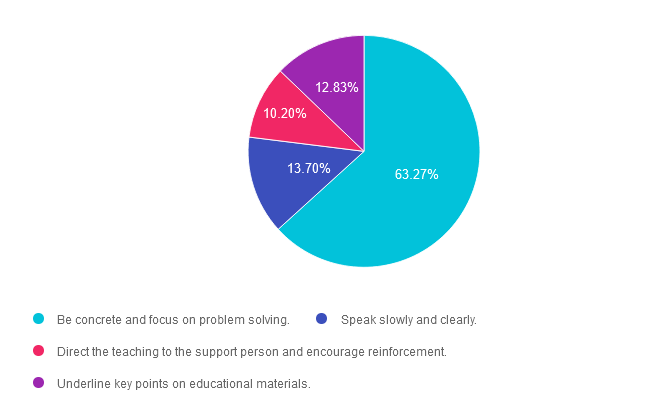
For last week’s practice question, we quizzed participants on what is the best approach for people with low literacy skills. 63% of respondents chose the best answer. We want to clarify and share this important information, so you can pass it on to people living with diabetes and your colleagues, plus prepare for exam success!
Before we start though, if you don’t want any spoilers and haven’t tried the question yet, you can answer it below: Answer Question
Question: Which of the following strategies is most effective when working with someone with low literacy skills?
Answer Choices:
- Be concrete and focus on problem solving.
- Speak slowly and clearly.
- Direct the teaching to the support person and encourage reinforcement.
- Underline key points on educational materials.

Getting to the Best Answer
If you are thinking about taking the certification exam, this practice test question will set you up for success. Test writers anticipate possible answers based on the details in the question. They will wave those “juicy answers” right under your nose. Your job is to weed through the particulars, pluck out the most important elements and choose the BEST answer.
Answer 1 is correct. 63.27% chose this answer. “Be concrete and focus on problem solving.” Yes, this is the best answer. Since a person with low literacy can’t take notes or read information later, they will need to commit new information to memory. By providing concrete examples and engaging in collaborative problem solving, a person with low literacy can more effectively retain the information.
Answer 2 is incorrect. 13.70% of you chose this answer. “Speak slowly and clearly.” Just because a person hast low literacy doesn’t mean they have an intellectual disability. Maybe they didn’t have a chance to complete their education or experienced some other impediment to learning how to read and write. We can use a usual conversational pace and annunciation with this individual.
Answer 3 is incorrect. About 10.20% of respondents chose this. “Direct the teaching to the support person and encourage reinforcement.” A general rule of effective communication is to direct the teaching and education to the person with diabetes, while including the support person.
Finally, Answer 4 is incorrect. 12.83% chose this answer. “Underline key points on educational materials.” Since people with low literacy have limited ability to read and write, using print materials with words would not be an effective method to provide education. Use of pictures and infographics, videos, podcasts or other educational strategies that don’t require literacy, would be excellent alternatives.
We hope you appreciate this week’s rationale! Thank you so much for taking the time to answer our Question of the Week and participate in this fun learning activity!
Want to learn more about this question?
ADA Standards of Care
Join us live on February 1, 2024, at 11:30 am PST

Topics:
- A review of changes & updates to the annual ADA Standards of Medical Care in Diabetes.
- Identification of key elements of the position statement.
- Discussion of how diabetes educators can apply this information in their clinical setting.
This course, updated annually, is an essential review for anyone in the field of diabetes. Join Coach Beverly as she summarizes the annual updates to the American Diabetes Association’s (ADA) Standards of Medical Care in Diabetes & provides critical teaching points & content for healthcare professionals involved in diabetes care & education.
Can’t make it live? No worries. We will send post the recorded version to the Online University within 24 hours of the broadcast
Instructor: Beverly Thomassian RN, MPH, CDCES, has been Board Certified in Advanced Diabetes Management for over 20 years. She is an Associate Clinical Professor at UCSF, a working educator, and a nationally recognized diabetes expert. She has a Master’s Degree in Public Health from UCLA, with a focus on behavioral health and education.
All hours earned count toward your CDCES Accreditation Information
Sign up for Diabetes Blog Bytes – we post one daily Blog Byte from Monday to Friday. And of course, Tuesday is our Question of the Week. It’s Informative and FREE! Sign up below!
The use of DES products does not guarantee the successful passage of the CDCES exam. CBDCE does not endorse any preparatory or review materials for the CDCES exam, except for those published by CBDCE.









